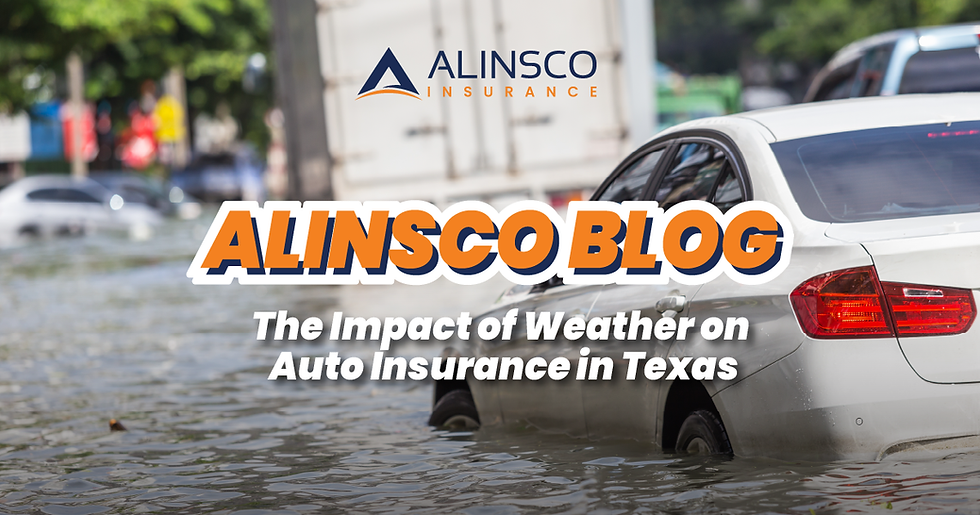Dealing with Uninsured and Underinsured Claims
- Alinsco Agency

- Jun 6, 2024
- 3 min read
Updated: Mar 18, 2025

Handling claims where the at-fault driver lacks adequate insurance can be a challenging experience for both policyholders and insurance agents. As an insurance agent, it's crucial to provide your clients with clear guidance and support during these stressful times. Here’s a comprehensive guide on how to navigate uninsured (UM) and underinsured (UIM) motorist claims, ensuring your clients receive the protection and compensation they deserve.
Understanding Uninsured and Underinsured Motorist Coverage
Uninsured Motorist (UM) Coverage: This type of coverage protects policyholders when they are involved in an accident with a driver who has no insurance. It covers medical expenses, lost wages, and other damages resulting from the accident.
Underinsured Motorist (UIM) Coverage: This coverage kicks in when the at-fault driver has insurance, but their policy limits are insufficient to cover the damages incurred by the policyholder. UIM coverage bridges the gap between the at-fault driver's insurance and the actual costs of the damages.
The Importance of UM and UIM Coverage
Encourage your clients to carry both UM and UIM coverage as part of their auto insurance policy. While Texas law requires drivers to have liability insurance, many drivers still operate without sufficient coverage. UM and UIM coverage provide an essential safety net, ensuring that your clients are not left financially vulnerable after an accident with an uninsured or underinsured driver.
Steps to Handle UM and UIM Claims
Gather Information at the Scene: Immediately after an accident, advise your clients to collect as much information as possible. This includes taking photos of the accident scene, gathering contact information from witnesses, and obtaining the other driver’s insurance details.
File a Police Report: Encourage your clients to file a police report, regardless of the severity of the accident. A police report serves as an official record and can be crucial when filing a UM or UIM claim.
Notify the Insurance Company: Instruct your clients to notify their insurance company about the accident as soon as possible. Prompt reporting helps in processing the claim efficiently.
Submit Required Documentation: Assist your clients in gathering and submitting all necessary documentation for the claim. This includes the police report, medical bills, repair estimates, and any other relevant evidence.
Cooperate with the Claims Adjuster: Encourage your clients to cooperate fully with the insurance company’s claims adjuster. This may involve providing additional information or clarification to support their claim.
Understand Policy Limits: Help your clients understand their policy limits and how UM and UIM coverage works. Explain how their coverage will compensate for medical expenses, property damage, and other costs associated with the accident.
Consider Legal Assistance: In some cases, it may be beneficial for your clients to seek legal assistance, especially if there are disputes over the claim. Legal experts can provide additional support and ensure that their rights are protected.
Tips for Agents
Educate Your Clients: Regularly inform your clients about the importance of UM and UIM coverage. Use newsletters, social media, and face-to-face meetings to highlight real-life scenarios where this coverage has provided crucial support.
Review Coverage Options: During policy renewals or new client consultations, review and recommend appropriate UM and UIM coverage options based on their needs and risk factors.
Stay Informed: Keep yourself updated on the latest changes in Texas insurance laws and regulations regarding UM and UIM coverage. This knowledge allows you to provide accurate and current advice to your clients.
Provide Resources: Offer your clients resources such as brochures, blog posts, and FAQs that explain the process of filing UM and UIM claims. This helps them feel more prepared and confident in the event of an accident.
Conclusion
Dealing with uninsured and underinsured claims can be complex, but with the right guidance and support, you can help your clients navigate these challenges effectively. By educating your clients about the importance of UM and UIM coverage and providing clear instructions on handling claims, you ensure they are well-protected and receive the compensation they need after an accident. At Alinsco, we are committed to supporting our agents and policyholders with the tools and resources necessary to manage these claims successfully.
This blog provides general information. Every situation is different, insurance policies vary, so please consult your policy or contact us for specific details and advice. This content is for informational purposes only and does not constitute legal or insurance advice.



Australian Assignment Help can be contacted for assignment help Australia assistance in assignment in all subjects.
Get accounting assignment help from the best Malaysian writers of Student Life Saviour in Malaysia.
The accountant shortage in the USA is becoming a big concern. By 2025, the demand for accountants will be much higher than the number of skilled professionals available. According to the American Institute of CPAs (AICPA) , there has been a 17% decline in accounting graduates over the past few years. Additionally, more than 75% of CPAs are expected to retire in the next 15 years, creating an even bigger gap.
I enjoyed reading this! This covers some important aspects that often get overlooked. Thanks for shedding light on them in such a clear and concise manner. Kadıköy Yeminli Tercüman
Arapça Yeminli Tercüman
İspanyolca Yeminli Tercüman
Almanca Yeminli Tercüman
Fransızca Yeminli Tercüman
İtalyanca Yeminli Tercüman
Yeminli Tercüman İzmir
Almanca Yeminli Tercüman Ankara
Kızılay Yeminli Tercüman
Çince Yeminli Tercüman
Yeminli Tercüman Ankara Translation Agency in Dubai
When you're struggling between complex assignments and preparing for exams at that we are available 24x7 and deliver assignments within the deadline and give solution for all your assignment needs. We cover all the subjects that are followed in the topmost universities around the world, It might be time to reconsider your tactics if your efforts continue to show in your grades. Please feel free to use the online assignment help option and get the best results.